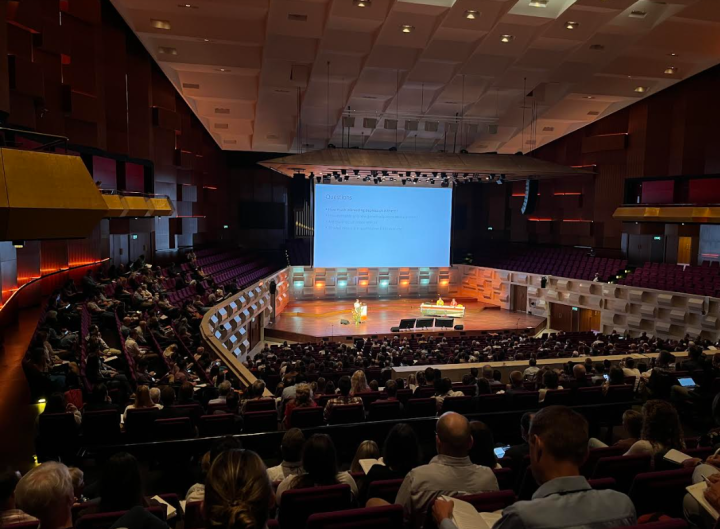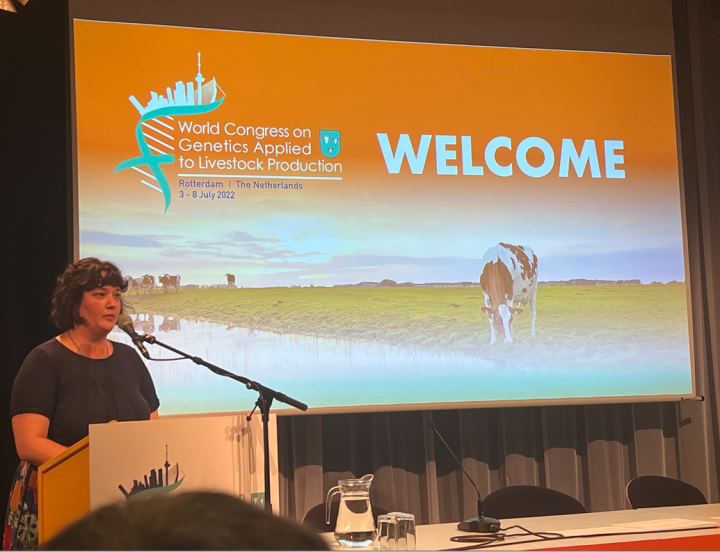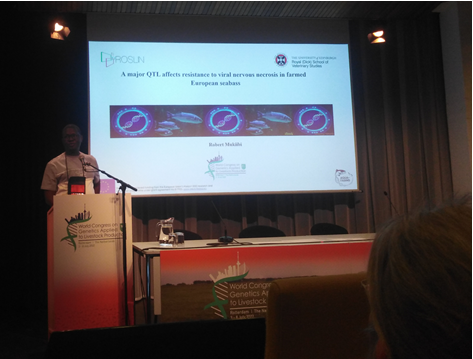World Congress of Genetics Applied to Livestock Production
Roslin aquaculture team attend WCGALP 2022
15/08/2022

The 12th World Congress of Genetics Applied to Livestock Production 2022 (WCGALP) took place in Rotterdam (The Netherlands) from 3rd to 8th of July 2022 (https://wcgalp.com). The WCGALP is also known as the “Olympics of Genetics” as it occurs every four years and gathers researchers from the entire world for 5 full days of presentations. Aquaculture was one of this year’s focal areas with an increase in the number of papers presented in the conference in comparison to the previous conferences, being accorded two full afternoon sessions on the second day of the congress. The Roslin Institute Aquaculture group was represented by; Agustin Barria, Clémence Fraslin, Robert Mukiibi and Saif Agha, who presented some of their most novel results at the conference.
Due to the pandemic and travel restrictions in the different parts of the globe, the WCGALP 2022 was unique since for the first time it was fully hybrid with online and onsite participants, providing an opportunity for a large number of scientists around the world to share their work. The scope of WCGALP 2022 was aimed at the sustainable production of high-quality animal proteins for a growing world population through modern animal breeding (https://wcgalp.com/wp-content/uploads/2022/07/e-WCGALP22-programme-booklet.pdf). Animal breeding relies on research and development as well as long-term commitment to increase the efficiency of the food chain, reduce its ecological footprint, minimize the use of antibiotics, and generally contribute to food security and safety, all while maintaining better health and welfare of farmed animals and meeting the changing consumer demands.

From the Roslin team, Clémence presented her results from the AQUAImpact project on “Potential of imputation for cost-efficient genomic selection for resistance to Flavobacterium columnare in rainbow trout” (https://www.wageningenacademic.com/pb-assets/wagen/WCGALP2022/12_007.pdf). Here, she demonstrated the potential of utilizing lower density SNP panels (as low as 300 SNP markers) and genotype imputation to enable cost effective implementation of genomic selection in the aquaculture industry.
You can find out more about Clemence and her work via her People page.

Robert presented results from the AQUA-FAANG project on “A major QTL affects resistance to viral nervous necrosis in farmed European seabass” (https://www.wageningenacademic.com/pb-assets/wagen/WCGALP2022/12_010.pdf). He showed a major VNN resistance QTL and potential causal genes they have identified on the European seabass’ chromosome 3.
You can find out more about Robert and his work via his People page.
The Aquaculture talks focused mainly on disease resistance traits including resistance to Flavobacterium columnaris in rainbow trout, Piscirickettsia salmonis, sea lice in Atlantic salmon, SRS in Coho salmon, and VNN in seabass. The second session focused on breeding and novel phenotyping techniques with an invited talk by Wageningen University’s Wout Abbink (https://www.wageningenacademic.com/pb-assets/wagen/WCGALP2022/17_005.pdf) on the possibilities of using electronic sensors to monitor different fish behavioural changes in breeding environments. He demonstrated that the electronic sensors they developed could be used to collect very accurate health, welfare and physiological trait measurements for breeding program management.
Saif Agha, of the Roslin Institute, had a talk in the “Novel trait: Health and well-being” session on “Genetic parameters of novel behaviour traits derived from social network in
pigs”. He presented how social network analysis has provided novel traits to describe aggressive behaviours in pigs, and that this trait could be used in selective breeding to improve pigs’ welfare. (https://www.wageningenacademic.com/pb-assets/wagen/WCGALP2022/32_015.pdf)
Part of the conference was aimed on the use of Whole Genome Sequence information, either to explore the genetic architecture of traits (GWAS sessions), where the use of WGS data improved QTL detection and fine mapping, or in two sessions that were dedicated to the challenge of using such information, with a focus on cattle. Theo Meuwissen presented an interesting talk “On the advantage of identifying causal genetic variants for genomic prediction” (https://www.wageningenacademic.com/pb-assets/wagen/WCGALP2022/54_009.pdf), concluding that in some cases identification of causal variants improved the prediction accuracy whereas for other traits surrounding SNPs could pick-up the effect of the variant. Knowing causal variant is helpful to understand the biology underlying the phenotype and opens up possibilities for gene editing.
The take home message from the GWAS session was that with more information, from phenotype genotype (including WGS data), we could detect more QTL, better explain the underlying architecture of complex traits and sometimes even detect candidate genes. This was also highlighted in the last plenary session by L. Yengo on “Discovery and lessons from a genome-wide association study of human height in > 5million individuals”. In his talk, Loic Yengo et al. presented a complex story of human height and the “missing heritability” (https://www.wageningenacademic.com/pb-assets/wagen/WCGALP022/59_001.pdf ) issue, which they examined by increase the number of both SNPs (WGS) and individuals (up to 5.4 million human sequences).
The session “Challenges – Genetic control of infectious disease transmission and impact” was also really interesting with an invited talk from P. Bijma et al., on “A quantitative genetic theory for infectious disease” (https://www.wageningenacademic.com/pb-assets/wagen/WCGALP2022/44_011.pdf). Andrea Wislon (Roslin Institute) was the invited speaker for the afternoon session and her talk on “New tools and insights to enable breeding for reduced disease transmission” complemented the previous session nicely. She mentioned the famous “IPN lucky case” and an experiment they did showing that selection for the resistance allele also reduced transmission. However, this is often not the case and other components of disease transmission (susceptibility, infectivity and recoverability) should be investigated in the future, using specific experimental designs and genetic-epidemiological inference tools. Overall, the take home message of this session was that selection for improved disease resistance will work but we need to put more intensity on it, and that fine phenotyping should be developed to not only focus on resistance but also on infectivity and transmissibility. Recent advances in sensor technology will allow the collection of large-scale high-quality phenotypes on diseased animals to consider all the aspects of infection and help reduce the negative impact of infectious diseases.
In addition, a significant part of the conference was dedicated to genomic prediction where new tools and strategies to improve the currently available methods for better prediction accuracy were presented. The new tools were mainly those that employed machine learning, deep learning and artificial intelligence. Tianjing Zhao from University of California Davis presented their new prediction method (https://www.wageningenacademic.com/pb-assets/wagen/WCGALP2022/02_007.pdf) that incorporates different intermediate omics through extending mixed models to multi-layer neural networks. Tianjing demonstrated on simulated that data that their new method had significantly higher prediction accuracy than “single” (genotype to phenotype) mixed model methods.
There also was an “early career researcher” session on career development organised in partnership with EFFAB/FABRE-TP that took place on the second day of the conference. In this session, a very interesting round table was held with well-known researchers that talked about the start of their careers, how networking is important, the importance of developing “soft-skills” and the struggles they had and still have for example regarding impostor syndrome. All participants were very open and this inspiring session ended with one-minutes pitches by senior scientists of various backgrounds, providing advice that will help early career researchers, such as:
Seize opportunity, put effort in presentation and papers at key moments, find your niche, do not hesitate to take risks. Build a network. Be confident in what you know and what you are able to do (you are an expert in the field, and should show leadership). Get out in the world, learn to communicate (writing and speaking), find people that you like working with and work with them. Go and look for challenges you are excited about! Go get the future!”
The abstracts for all presentations will be made available in the Proceedings in October 2022 http://www.wcgalp.org/

